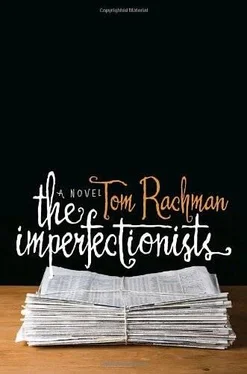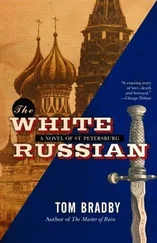She toys with this while onstage during a media conference at the Cavalieri Hilton in Rome. The subject of the panel discussion is "How the International Press Views Italy," an enduring preoccupation in the country. She resents having to attend-it's clearly a task for their young publisher, Oliver Ott. But he has gone missing again and ignores her phone calls. So the conference is left to Kathleen and the paper must manage in her absence. It is not managing well, if the constant stream of text messages on her BlackBerry is any indication.
"Will the newspaper industry survive?" the mediator asks her.
"Absolutely," she tells the audience. "We'll keep going, I assure you of that. Obviously, we're living in an era when technology is moving at an unheralded pace. I can't tell you if in fifty years we'll be publishing in the same format. Actually, I can probably tell you we won't be publishing in the same way, that we'll be innovating then, just as we are now. But I assure you of this: news will survive, and quality coverage will always earn a premium. Whatever you want to call it-news, text, content-someone has to report it, someone has to write it, someone has to edit it. And I intend for us to do it better, no matter the medium. We are the quality source among international newspapers, and I encourage anyone who doubts this bold claim to buy the paper for a month. Better yet"-lilt in voice; complicit smile to audience; pause-"better yet, buy a two-year subscription. Then you'll really see why our circulation is rising." The audience laughs politely. "My work is putting together the outstanding publication in its class. If we can do that, readers will turn up. Those of you who have followed the paper's progress since I became editor in 2004 will know the radical changes under way. There are more to come. It's thrilling to be a part of, to tell the truth."
What truth? The paper is hardly at the cutting edge of technology-it doesn't even have a website. And circulation isn't increasing. The balance sheet is a catastrophe, losses mount annually, the readership is aging and dying off. But she has acquitted herself well onstage. The audience applauds and hurries out for the free lunch, while she excuses herself to the organizers. "I wish I could stay," she tells them, "but that's life at a daily newspaper."
On her way to the cloakroom, she is approached by a Chinese American student from the audience. He introduces himself as Winston Cheung, dabs sweat from his face, wipes his glasses, and proceeds to rattle off his academic credentials. Since he won't get to the point, she gets there for him. "Okay," she interrupts. "And the punch line is, Do I have a job for you? You said you're studying primatology, right, so I'm guessing you'd be interested in a science section, which we don't have. If you wanted to report general news, lots of publications are hunting for people with language skills. Do you speak any Asian languages?"
"My parents only spoke to me in English."
"Pity. Languages are key. You don't, by any lucky chance, speak flawless Arabic?"
"Not flawless Arabic, no."
"Meaning you speak flawed Arabic?" she says. But this guy is a nonstarter-no experience, no languages, and look how jittery he is. She needs to get rid of Winston Cheung. "Look, if you want to send us something-purely on spec-we'd look at it." She rattles off Menzies' email address and ducks into the cloakroom.
As she heads for the exit, someone touches her shoulder. She turns irritably, expecting Winston Cheung again. But it's not him.
She steps back with surprise. "My God," she says. "Dario."
Dario de Monterecchi is the Italian man she lived with in Rome during her twenties. When she left the city in 1994 to take a reporting job in Washington, she left him, too. Now here he is, temples graying, eyes bagged, slightly handsome but slightly jowly, wearing the sleepy surrender of the family man. "Sorry to sneak up like that," he says. "Did I scare you?"
"You have to try harder than that. I am somewhat caught off guard, though. My God, it's so strange seeing you. How are you?"
"I'm well," he says. "And you were excellent today. I'm most impressed. But are you leaving?"
"Sadly, yes. I have to. They need me at the office," she answers. "I'm sorry, by the way, that I haven't been in touch since I got back to Rome. It's been crazy. You knew I was back, right?"
"Of course."
"Who from?"
"Just heard-you know how small Rome is."
"Weird having my private life pop up when I'm in professional mode. Puts me off balance," she says. "You might not believe this, but I really wish I didn't have to go."
"Not even time for lunch?"
"I don't get lunch, alas. We close the first edition in a couple of hours. If I'm not there, the world ends. What are you doing at this event anyway?"
He hands her his business card.
"Oh, no," she exclaims, reading the card. "I'd heard a rumor about this. But Berlusconi? Ouch."
"I do press for his party, not for him personally."
She raises her eyebrows skeptically.
Dario says, "I was always on the right, remember."
"Yes, yes, I know. I remember you."
"Well, anyway," he says, "I should let you go." He kisses her cheek. She rubs his back. "You don't need to keep comforting me," he says, smiling. "I'm not still upset."
She grabs a taxi outside. As the cab speeds toward the city center, she consults her BlackBerry, which is pulsating with messages from Menzies: "General Abizaid testifying to Senate about Iraq. How should we cover?? Call please!" Meanwhile, Dario-who slept beside her and woke beside her for six years of her life-has vanished from mind. She can't help it: she's of the newspapering temperament, and he's no longer front page. When, she wonders, do people have time to contemplate anything? But she has no time to answer that.
She passes through the paper's various departments to consult on tomorrow's edition. Her arrival halts conversations, prompts sheepish expressions and flurries of phone calls that should have been made earlier. The afternoon meeting is a farce. The usual suspects trickle in and settle around the oval table. Kathleen listens. Then she speaks. She isn't shrill-she never is. She is deliberate and pulverizing. She commands actions, concludes with "All right?" and walks out of the room.
Her chief ally-the only person she holds to be her intellectual equal at the office-is Herman Cohen. He is waiting in her office when she returns. At the door, she covers her face playfully to block him from view, then enters, crossing her index fingers as if before a vampire. "Please don't."
"You know you want it," he says, handing her the latest copy of his in-house newsletter, Why?, with which he chronicles mistakes in the paper. "Everything well, my dear?" he asks.
"I go out for one morning and this office turns into the monkey enclosure."
"You're starting to sound like me."
"And I'm getting bombarded with emails from Accounts Payable," she says, meaning the chief financial officer, Abbey Pinnola. "Supposedly I have to offer human sacrifices."
"She wants layoffs now?"
"So it seems. Not clear how many."
"Technical staff or editorial?"
"We'll see. Who would you pick from editorial?"
At the top of his list is Ruby Zaga, a copy editor who's notorious for inserting errors into stories.
"Is she really the worst?" Kathleen asks.
"I forgot, Ruby's a friend of yours."
"Hardly a friend. But can't we fire Clint Oakley?"
"Someone has to put together Puzzle-Wuzzle, my dear."
"I'm telling Accounts Payable that I'll consider layoffs if I get money for a stringer in Cairo, plus someone to replace Lloyd in Paris."
"Good for you. Stick to your guns."
"It's beyond me," she says, "how Abbey can say that covering Cairo and Paris is a luxury. How is that a luxury? It's a necessity. Luxury these days is actually having a conversation about what goes in this paper. All I do is cover over cracks. It's depressing."
Читать дальше












